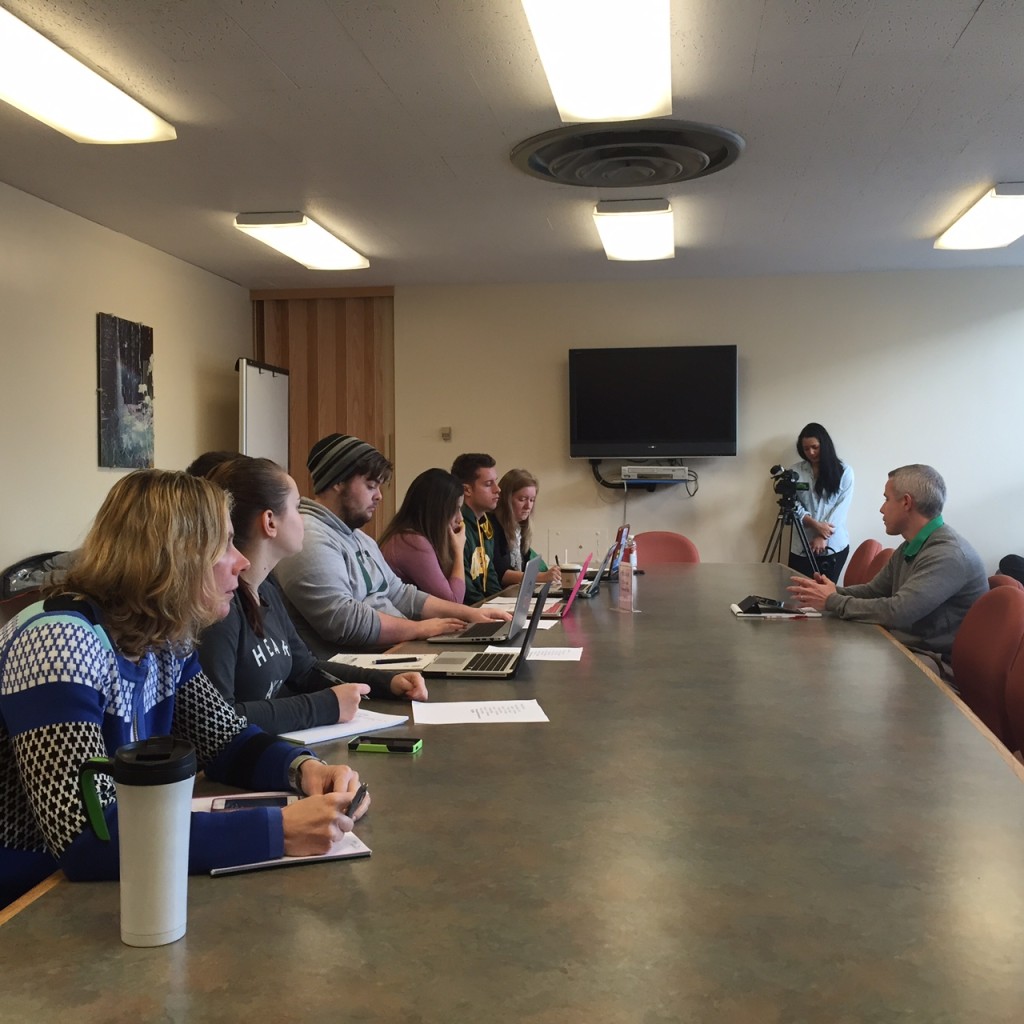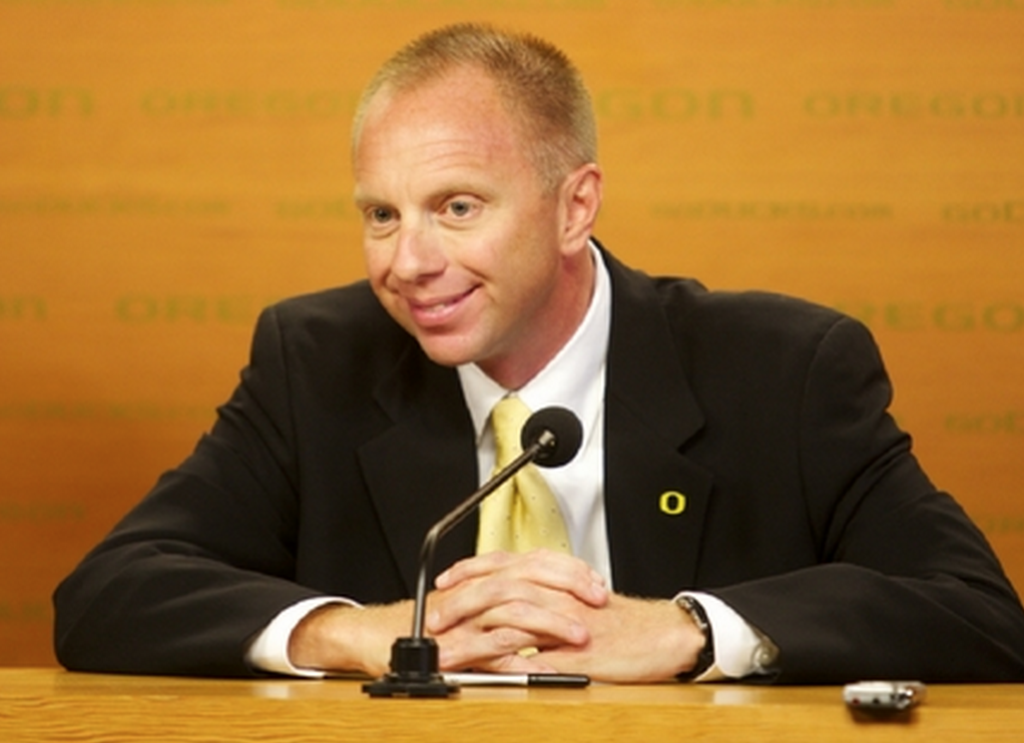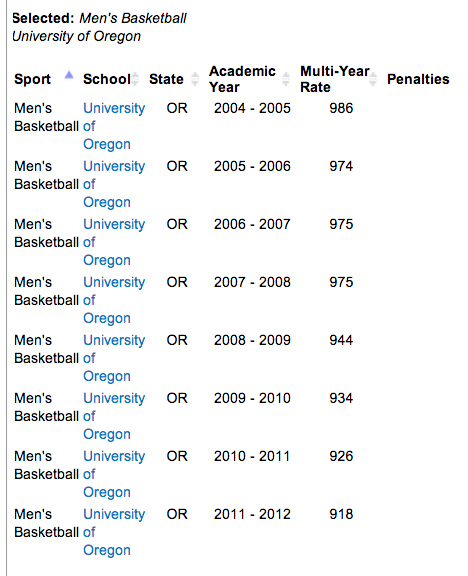2/21/2015 update: That’s the vote from today’s ASUO meeting.
Duck Athletic Director Rob Mullens is now in the difficult position of having to choose between:
a) taking the same $1.6M as last year and being revealed as the sort of person who would try and bluff our students for money, or
b) cutting the ticket allotment and being revealed as the sort of person who would take revenge on the students over $50K, after getting a $250K raise himself.
Presumably he’ll figure out some way to take the offered 0% increase and try and save face. My guess is this will involve a donation from some Duck booster who suddenly finds it in his heart to give a little to UO students.
By rejecting the Duck try for a 10% increase, our students are leading the way to the March 4th meeting of the full UO Senate, which will consider legislation to hold the Athletic Department to its 2004 promise to start making payments to UO’s academic side for academic scholarships. The student vote is a hopeful sign that maybe UO can finally figure out how to balance the interests of the Duck’s big-time sports enterprise and its well paid coaches and AD’s with those of UO’s cash-strapped academic side.
2/21/2015 update: Meanwhile, the University of Akron is *paying* its students to go to basketball games, in an effort to build some buzz for TV. And in cash – not just Uncle Phil bobbleheads.
Ironically, as Fox Sports points out, if Akron were to give the *players* $5 for showing up for each game, they would swiftly bring down the wrath of UO’s Jim O’Fallon and his NCAA infractions committee.
2/20/2015: Lubash and ASUO Student Senators call out Eric Roedl out on his ticket threat
Letter to the Daily Emerald, written by UO undergrad and Truman Scholar Andrew Lubash, and signed by 13 other Senators and 3 ACFC members, here:
… Out of the $15 million ASUO budget, students spend $1,695,348 paying for the football and men’s basketball ticket lottery. This comes down to about $71 per year that students pay through their mandatory fees for the chance to go to our athletic events. We, the undersigned, think this is too high. …
However, when the ASUO began negotiating with the Athletics Department this year, we were surprised to find out that not only was there absolutely no chance they were going to give us more tickets, they were requesting $169,000 more from students than last year, for the same number of tickets. A 10% increase!
We were infuriated.
Now, they say that they will likely begin cutting student football tickets if we don’t give them at least a 3% increase (~$50,000). Their actions are greedy and deplorable. They’re acting like a business focused solely on profit, when they should be working towards supporting the academic side of this university. Why isn’t there an expectation on our campus that athletics give back to students? Students aren’t even guaranteed a ticket.
… After an article came out in the register Guard saying that the Athletic Director would fundraise millions in order to pay for his own salary increases ($700,000/year) and those of other Athletic department staff, we had had enough. We find it fundamentally unfair that the Athletic Department can find it within their hearts to fundraise for themselves, yet they resort to threatening to cut student tickets if the ASUO does not give them their requested increase. Is it actually that hard for them to raise $50,000 on top of the millions they already plan to raise? We don’t think so.
… At some point, someone needs to stand up and shine a light on the enormous difference that exists between what the Athletic Department deems as “necessary” and what students deem as excessive. Many of us struggle to afford our education as it is. We should not stand for our own Athletic Department to treat us as another lucrative source of funds to line their own pockets with. It’s time for them to start giving back and support students of all financial backgrounds.
We don’t understand how the ASUO, in good conscience, could increase the Athletic Department’s budget $1 unless we guarantee that students get more football ticket. If more tickets is not an option, we should not agree to charge students more for the same amount of tickets.
[Signed by 17 Student Senators, etc.]
2/19/2015 update: Duck’s Eric Roedl threatens to cut student tickets unless they pay 10% more:
Actually, our students have already talked him down to a 3% increase, and Roedl’s latest threat seems pretty unlikely, given that Scott Coltrane just told the UO Board that athletics would have no problem coming up with millions to pay for raises for Helfrich and Mullens.
But Roedl’s giving it a half-hearted effort anyway. Gotta try and cover his own $42K raise, I suppose:
From: Eric Roedl
Date:02/19/2015 4:05 PM (GMT-08:00)
To: [student name redacted]
Cc: Laura Jorgensen
Subject: Student Seating Options
[Student name redacted]
Attached ticket calculator contains two options:
1. Represents a 3% increase to I-Fee as discussed with no impact to student seat allocation.
2. Represents a 0% increase to I-Fee. Under this model we would likely [emphasis added] reduce the number of football seats per Pac 12 Game (Utah, Wash. St., Cal, USC, Oregon St.) by 300. We would then increase the number of Pac-12 Season Student Season Ticket Plans available for student purchase (at a price of $300 per package) by 300.
Please review and let me know if you have any questions or thoughts prior to submitting.
Thanks, Eric
Spreadsheet here.
2/10/2015 10:30 update: AAD Eric Roedl fails to talk students into paying more
The committee can’t agree, so the default recommendation of $0 goes to the ASUO Senate, for a Feb 24. vote. That’s a $1.6M cut from last year. Rob Mullens has two weeks to raise the money from donors, twist enough arms in the student senate to get a bailout, or convince Scott Coltrane to stick to the threat of a cut in tickets if the students don’t pay up.
The compromise plan should be to switch to a voluntary athletics fee. Roedl hates that idea because he wants to hide the true cost of “free” tickets from the students.
8:00 AM Tuesday, Now, in the EMU Rouge River room.
Lubash is giving Roedl a brutal beating. Roedel is trying to cram down a mandatory student fee increase, the day after the AD announced it had the funds to give $2M in raises to the coach and athletic director.

My guess is Roedl bails and leaves the money on the table, but who knows? Students will have to play hardball, and he’s spewing doubt and confusion.
Student asks what would happen if they cut the IFee? Roedl won’t say.
Lubash: You say you can raise money to pay for coach’s raises. Why not go out to you donors and ask for money to pay for cuts in student ticket prices.
Hansen: Notes that the AD estimate for ticket values assumes demand curves don’t slope down. Ben assigns failing grade.
Schlegel: Never a campaign among donors to get donations for student tickets? Roedl: Not to my knowledge.
I gotta go, sorry no more live-blog.
3:30 PM update: UO Board approves fat raises for Helfrich, Mullens. Ducks want more student cash.
Diane Dietz has the story, here.
It’s tough listening to Coltrane push this on the Board: “The cost of these contracts is borne entirely by athletics”. Sure, if you ignore the millions in hidden subsidies from student tuition money.
The brown-nosing at this meeting is pretty deep. The trustees did have some tough questions about the Falling Sky contract to sell beer to the students at the new EMU though.
2/9/2015 update: That’s what’s happening today, in 15 minutes, at the Board’s EAC meeting. Angela Wilhems is still hiding the contracts, but it looks like Mullens will get a $250k raise to $700K, while Helfrich will go from $1.5M (if I remember right) to ~$3.5M. Plus a plethora of bonuses, of course.
Well this certainly explains why Mullens has been trying to get more money out of the UO students. More on that below and here.
2/9/2015: With Matt Court attendance < 50%, Mullens wants to raise student fee
According to this new report from the OC Register’s Ryan Kartje, Oregon’s basketball attendance is down 24% from last year. Word is the student section was half empty tonight.
But apparently that’s not going to keep Duck Athletic Director Rob Mullens and his AAD Eric Roedl from trying to raise the mandatory fee they charge UO students for tickets. Kaylee Tornay has the report in the Daily Emerald, here:
The Feb. 6 budget hearing between the athletics department and the Athletics and Contracts Finance Committee, which determine annually the amount and price for student ticket distribution for football and men’s basketball games, led to yet another stalemate in reaching an agreement. The ACFC approved a proposal of an 18.9 percent decrease to the Athletics Department’s current ASUO budget. Later, this decision was overturned due to faulty voting processes, according to ACFC Chair Andrew Lubash.
The budget hearing was the second held this year to work out how much it will cost students next year, regardless of whether they attend athletic events or not, to receive the same amount of tickets to athletic events that they received in the 2014-2015 school year. Students pay for 5,448 tickets per regular season football game and 1,854 per basketball game. These are distributed via a lottery system (when you log onto goducks.com and watch the O spin for an hour hoping to get a ticket) that is funded by a percentage of the Incidental Fee, which each student pays every enrolled term.
This year the student body as a whole paid the Athletics Department $1,695,348 for the ticket lotteries for football and men’s basketball. The Athletics Department opened negotiations this fall requesting a 10 percent increase to provide the same amount of tickets for the 2015-2016 year. This would mean an additional $169,535 and would bring next year’s total to $1,864,883.
The ACFC met with Athletics on Jan. 16 and negotiated the request to a possible 3 percent increase rather than 10 percent. That would mean students would pay $50,860 more than they did this year. However, no official agreement was reached, and the ACFC discussed the athletics budget again in a meeting on Jan. 30. Ronnie Grenier-Hemphill, the chief liaison between the Athletics Department and ACFC, informed the Committee that Eric Roedl, Executive Senior Associate Athletic Director of Finance, had brought up the possibility of having to cut the amount of tickets, if anything less than the 3 percent increase were approved.
The Emerald followed up with Roedl on the matter and he delivered the following comment:
“Maybe we’d adjust the ticket allotment in some ways to more accurately reflect the value and the money that’s being transacted…we’d continue to have dialogue to find something that works for everybody.” Roedl said.
Funny, I don’t remember anything about falling attendance in Roedl’s powerpoint, when he was hitting up the students for a 10% increase.
If the students do pay this, where will the money go? To people like AD for Finance Eric Roedl, who’s already managed to scrape up the funds to give himself a $42K raise, to $212K, in just two years:
2014:

2012:





